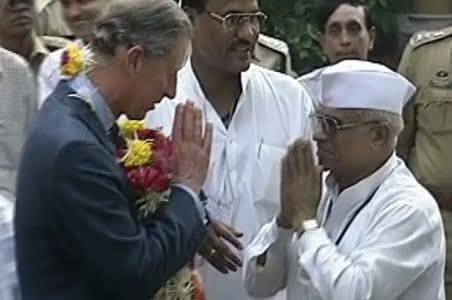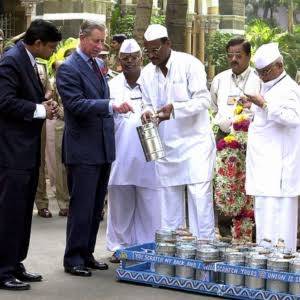As a token tribute, the dabbawalas paid homage to the Queen at the Borivali railway station in north Mumbai, since Friday is a public holiday..writes Quaid Najmi
The famed ‘dabbawala’ (tiffin-carrier) community of Mumbai mourned the passing away of Great Britain’s Queen Elizabeth II at 96 after a brief illness, here on Friday.
The Nutan Mumbai Tiffin Box Suppliers Association Charitable Trust Chairman Ulhas Muke said the Mumbai dabbawalas shared a close association with Britain’s royal family.
“We are extremely sad to hear about the passing of Queen Elizabeth II… There was a wave of shock and disbelief among the dabbawalas community last night when they heard the devastating news. We all pray that her soul rests in peace,” said Muke in a statement.
As a token tribute, the dabbawalas paid homage to the Queen at the Borivali railway station in north Mumbai, since Friday is a public holiday, NMTBSACT spokesperson Ritesh Shantaram Andre said.

Maharashtra and Mumbai are currently immersed in the immersion ceremonies of gigantic, big, medium and small idols of Lord Ganesh on the occasion of Anant Chaturdashi, marking the curtains on the 10-day long Ganeshotsav festival.
The dabbawalas enjoyed a close rapport with the British royalty ever since the Prince of Wales — now King Charles — visited and interacted with them first in 2003.
Highly impressed by their work and sheer dedication, later the British royal family had invited the dabbawalas’ leaders to Prince Charles and Camilla’s wedding in April 2005.
Two dabbawalas’ representatives — Raghunath Medge and Sopan Mare — attended the royal wedding, rubbing shoulders with other VVIPs from across the globe.
At the wedding, the dabbawalas had gifted a kurta set to Prince Charles and a sari to his wife Camilla, plus one trademark ‘dabba’ (tiffin).
In April 2016, during the first visit of the Duke and Duchess of Cambridge Prince William and Kate Middleton, the Mumbai dabbawalas had welcomed them as warmly as they would welcome a ‘mulga’ (son) and ‘suon’ (daughter-in-law).
At that time, the dabbawalas presented the Duchess with a coveted Paithani sari, considered an auspicious gift for a Maharashtrian bride, and a ‘pheta’ (headgear), a picture and statuettes of Lord Vithoba and his consort Rukmini.

Lord Vithoba and his consort are the presiding deities of the state as also the dabbawalas, whose main temple is in the pilgrimage centre of Pandharpur in Solapur district.
Later, in May 2018, during the wedding of Prince Harry and Meghan Markle, the dabbawalas sent a gift of a traditional ‘pheta’ (turban) for the groom and a special kurta-lehenga for his bride.
In May 2019, another body, the Mumbai Dabbawalas Association had presented a special set of silver jewellery to Prince Archie — the son of Prince Harry and Meghan Markle.
At that time, MDA spokesperson Subhash Talekar had excitedly told IANS: “We feel as if we have all become ‘Ajoba’ (grandpa). We have presented them with a silver ‘kamarpatta’, ‘toda’ and ‘wala’ (waist-band, wrist-band and anklets), gifted to a grandson.”
The dabbawalas are grateful that it was owing to the respect given to them and their humble trade by King Charles two decades ago that their 132-year-old tribe attained global fame and accolades.
Instantly recognized in their simple but iconic attire — a white kurta, loose pyjama and a cap — since 1890, the 5,000 dabbawalas deliver over 2,00,000 lunch tiffin boxes to hungary government or private companies’ staffers and even students daily all over the city, and post-Coronavirus pandemic, diversified into other related service sectors.

Leave a Reply